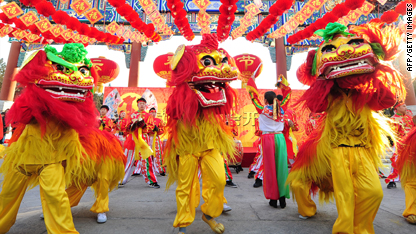Scammer
Banned

-- Chinese celebrate the Lunar New Year as their most important holiday. It's about family reunions and involves the world's largest annual human migration.
About 230 million people are expected to take the train during the official travel period between late January and February 27, railway officials say. Around 30 million travelers will take the plane, and millions more will go by bus.
It's an annual scrum for tickets to get home.
Zhou Jie is among the luckier ones. Two weeks ago, the 45-year-old migrant managed to snap two train tickets through a scalper, so that she and her husband could return to their home in central Anhui province for the holiday.
"We paid more to get hard-seat tickets," she tells me by phone from her rural home. "But it's okay because we're happy to be together with our children." She and her husband work as migrant workers in Beijing, while their two adult children remain in their hometown.
For many Chinese, the Lunar New Year, also known as the Spring Festival, is the only time they visit home during the year. "It's important for us to get together, however briefly," Zhou says.
Chinese families remain strongly influenced by tradition in the ways they celebrate the holidays.
The most important part of the festival is the nianye fan, or "reunion dinner," which family members attend in the hours leading to the New Year's eve.
While eating a feast of traditional food like noodles, fish and dumplings, they gather around the TV set watching the "Spring Festival Eve Gala," featuring performances by entertainers and celebrities. For over 20 years, the marathon TV extravaganza has been China's most watched variety show, raking in huge advertising revenues and catapulting artists to stardom.
Setting off fireworks is another enduring tradition.
At the height of Chairman Mao's rule in the 1970s, Beijing prohibited fireworks, ostensibly because they were "bourgeois" and a "waste of money."
Years after Mao's death, the practice returned with a vengeance after authorities lifted the ban. Two years ago, fireworks set off a huge fire that gutted a brand-new hotel in central Beijing, briefly prompting calls for a return of the ban.
Days earlier police advised Beijing residents to "set off fireworks in a civilized way," but that caution fell on deaf ears. The stroke of midnight into February 3 brought a flurry of fireworks that turned parts of Beijing into virtual war zones. According to local folklore, fireworks drive away monsters and evil spirits.
What does the New Year offer?
2011 is the Year of the Metal Rabbit.
Once upon a time, according to local folklore, the Jade Emperor thought he would assign an animal to each year so people could more easily remember the Zodiac cycle. So he called for a meeting with all the animals and decided he would choose 12 of them to be the Zodiac animals, depending on the sequence of their arrival.
Nimble and lucky, the Rabbit was fourth.
Conventional wisdom says the Rabbit traveled through an arduous path in order to reach its goal to meet the Emperor. Every time the rabbit hops forward, it looks back to see if it's going the right way.
That could be an apt metaphor for the way China is moving. As China struggles to curb its overheated real estate market and its high inflation rate, the Year of the Rabbit may be an opportune time for Beijing's leaders to take a step back to review its progress and plot its next steps. Top Chinese leaders underscore the need to maintain social stability and harmony. A week before the Spring Festival, Premier Wen Jiabao led a group of senior officials to hear complaints from farmers and migrant workers who trekked to Beijing seeking redress. Typically, their grievances would include cases of land grabs, unpaid wages and official malfeasance.
It was the first time a Chinese premier had met with petitioners. "Respect the opinions of farmers, give them reasonable compensation and protect their rights," Premier Wen urged the officials
Will the Year of the Rabbit be a good year?
Chinese astrologer Alvin Ang of Bazi Destiny foresees "the global situation may be affected by serious political change and global calamities."
Hong Kong-based feng shui master Joseph Wong gives a different take. "This coming year everything will be better than last year," he told CNN's Pauline Chiou. "They will see business go upwards mostly, but take care with the shares and stocks. There will be some fluctuations in August and September."
That does not directly concern me because I do not play the stock market, but I was curious to hear what Master Wong said of people born in the Year of the Rabbit. I am a "Rabbit."
Rabbits tend to be cunning and creative, he said, and get along well with people born in the Dog, Pig and Sheep years.
What is Wong's advice on prosperous feng shui?
The luckiest direction this year, he reckoned, is the northwest. To bring harmony in one's home, he counsels placing the bed in the northwest part of the bedroom. For good fortune, he says one's desk must be in the northwest part of the office.
Whether we take this seriously or with a pinch of salt, the Year of the Rabbit could turn out to be full of twists and turns.
